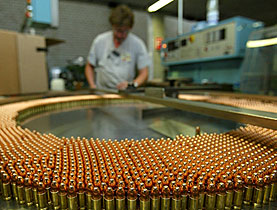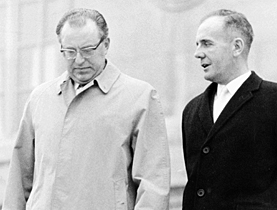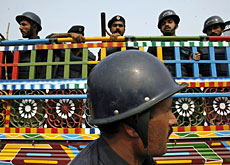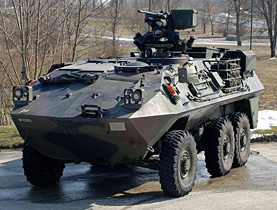Weapons export ban vote to test emotions

A popular initiative calling for a ban on Swiss weapons exports has locked pacifists and business leaders in a conflict that will be resolved on polling day.
Swiss industry has mobilised a campaign against the ban, arguing that it would cost jobs while the “yes” camp says lives come before profits. The government has recommended that voters reject a ban.
On November 29, Switzerland will vote on the controversial and emotional subject for the third time since 1972. Two previous attempts to halt Swiss-made weapons exports have failed.
Unlike previous attempts, the current initiative only calls for a ban on military, not civilian, weapons and ammunition. It also stipulates that taxpayers’ money should be spent on retraining the industry’s workforce for more peaceful production.
The Group for a Switzerland without an Army – the body behind the initiative – is convinced that people would back an export ban this time around.
War and peace
“We don’t want Swiss weapons to be involved in wars any longer and we don’t want Switzerland to export weapons that are used in conflicts that the majority of the Swiss population are not in favour of,” spokesman Tom Cassee told swissinfo.ch.
“It also contradicts our neutrality. When a country is not involved in foreign wars it should not export weapons to other countries,” he added.
Switzerland’s leading business and manufacturing organisations launched a coordinated campaign this week against a ban. They believe companies would collapse and that 10,000 jobs could be lost, also in the civilian sector where some military technological innovations are used.
“It’s not a question of war and peace. We have to be realistic, there are conflicts around the world,” Swiss Business Federation director Pascal Gentinetta told swissinfo.ch.
“Most of the weapons are used for self-defence and Switzerland also has the right to defend itself. Because we are a small country we have to export goods abroad [to support the industry].”
In addition, the campaign argues that spending an estimated SFr500 million ($490 million) of federal funds to repair the damage would be folly in the current economic climate.
Export destinations
The Swiss cabinet has also come out against a weapons export ban. Economics Minister Doris Leuthard told a public meeting in Zurich on Monday that Swiss controls of the annual 2,000-2,500 export requests are the tightest in Europe.
She added that 70 per cent of material goes to European Union countries. “Even in less developed countries people have the right to defend themselves. Humanitarian aid is only possible with a certain amount of military back-up,” Leuthard said.
She added that a collapse of the Swiss weapons industry would also harm the country’s own army.
Tom Cassee said the people’s initiative was not a back door route to getting rid of the Swiss army. And he insisted that some Swiss-made weapons end up in the wrong hands, taking particular issue with exports to Saudi Arabia and Pakistan.
“There are a lot of Swiss weapons killing innocent people in Iraq and Afghanistan at the moment,” he told swissinfo.ch. “Nobody can be sure that [Swiss-made] weapons are not in the hands of the Taliban because we know that a lot go directly from the Pakistan army to the other side.”
A survey by the gfs.berne polling and research institute, six weeks before the vote, found that 41 per cent of those questioned intended to vote in favour of the export ban while 44 per cent said they would oppose the initiative.
Matthew Allen, swissinfo.ch
The Swiss will vote on November 29 on an initiative calling for a ban on transit of war materiel from Switzerland. More specifically it seeks to ban the export of small arms, military training aircraft and obsolete military equipment no longer used by the Swiss Armed Forces.
The ban would not apply to hunting and sport weapons, demining systems, goods temporarily exported by the Swiss authorities and those for civil protection.
The initiative was launched by the pacifist Group for a Switzerland without an Army and filed in September 2007, and has been signed by over 109,224 citizens.
In 1997 a similar initiative to ban arms exports was rejected by three out of four voters.
War materiel cannot be exported to countries involved in an internal or international armed conflict, or those systematically and seriously violating human rights.
No sales are allowed to developing states that also receive development assistance or if there is a strong risk that weapons will be used against civilians or sold to another destination.
In August 2008, the cabinet recommended voters reject the people’s initiative and clarified how existing legislation, which in theory already restricts the export of weapons to certain states, would be applied.
Economics Minister Doris Leuthard warned against acceptance of the initiative, arguing that Swiss technical innovation was at stake in addition to the industry’s 5,100 jobs.
In 2008 Switzerland exported materiel worth a record SFr722 million ($695 million) to more than 70 countries.

In compliance with the JTI standards
More: SWI swissinfo.ch certified by the Journalism Trust Initiative




You can find an overview of ongoing debates with our journalists here. Please join us!
If you want to start a conversation about a topic raised in this article or want to report factual errors, email us at english@swissinfo.ch.